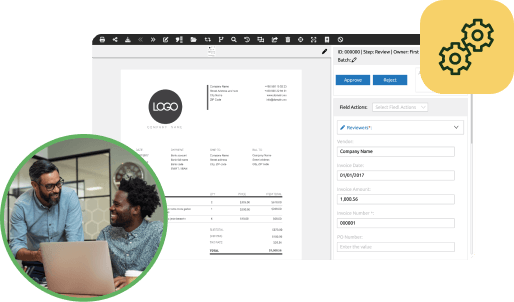
Salim Khalife
Salim Khalife founded Paramount Workplace, now a subsidiary of PairSoft. He currently uses his decades of SaaS experience in the consulting space and is based out of Michigan with his family.
View all posts by Salim KhalifeSalim Khalife

In today’s digital world, eCheck payments are becoming increasingly popular as a form of digital payment. But what exactly are they? Why are they so essential now and moving forward?
In this post, we’ll explore the basics of electronic checks and outline some benefits they offer to both large and small businesses and consumers. We’ll also discuss how electronic checks will likely evolve, making them even more indispensable for online transactions. So if you’re curious about this leading payment method, keep reading!
Electronic checks (eChecks) are electronic payments that allow you to send money directly from your bank account to another person or business. eChecks work similarly to regular paper checks, but they’re processed electronically, making payment processing much faster.
There are several ways to process an eCheck, but the most common is through the Automated Clearing House (ACH) network. To make an eCheck payment, the payer provides their bank routing number, account number, and payment amount.
The payee’s bank will verify the information and initiate an electronic fund transfer. eChecks are often used for recurring payments, such as subscriptions or monthly bills into merchant accounts.
If you are using Enterprise Resource Planning (ERP) software to automate your accounts payable processes, you can easily set up ACH payments. When you create an invoice in your ERP, you will enter the payment information for the recipient.
The ERP system will generate an eCheck payment and send it to the recipient’s bank. The funds will then be transferred from your bank account to the recipient’s bank account.
eChecks offer businesses a simple way to reduce payment processing fees. When traditional paper checks are processed, companies must pay for the cost of printing, postage, and staff time to enter data into their accounting software manually.
Writing and processing paper checks can be time-consuming, especially if a company pays multiple suppliers. Using eCheck payments can help financial institutions streamline financial operations and improve overall efficiency.
eChecks offer a high level of security with features like authentication, encryption, and duplicate detection. Compared to traditional paper checks, eChecks are much more challenging to alter or duplicate fraudulently. That’s because eChecks are digital documents electronically signed and certified with a unique certificate authority.
Electronic checks help improve cash flow management by assisting businesses to ensure they have the funds available when needed, without having to wait for traditional paper checks to clear.
eChecks can be used to pay bills electronically or to make person-to-person payments. They can also be set up for checking accounts and recurring payments, making it easy to pay bills on time each month without forgetting to write a check.
Therefore, many companies are embracing electronic checks as a trustworthy alternative payment option, given their many advantages. Accepting eChecks only makes sense given their high levels of security, practicality, and affordability.
The COVID-19 pandemic has forced businesses of all sizes to re-evaluate how they operate. One of the most critical changes enterprises have is how they process payments.
In the past, many businesses relied on paper checks to pay their suppliers. However, with so many people now working remotely, mailing checks is no longer a viable option. This has led businesses to look for alternative payment methods that are more efficient and secure.
Looking ahead, it is clear that eCheck payments are here to stay. Businesses that have not yet switched to eChecks will need to do so to remain competitive.
Consumers are becoming increasingly accustomed to paying with eChecks, and businesses that don’t offer this option will find themselves at a disadvantage.
If you’re new to eCheck payments, here are a few tips to help you get started:
By following these eCheck transaction tips, you can effectively make the most of eCheck payments and ACH direct deposit.
The processing time for an eCheck payment is typically 1-2 business days, but it can take up to 5 business days for the funds to be transferred.
Yes, eChecks can be used by large and small businesses. If you’re a small business owner, you may find that eChecks are a convenient and cost-effective way to process payments.
To process eChecks within your ERP, you will need payment processing software, the payer’s bank account number and routing number, and your bank routing number and account number.
Electronic check payments are essential for conducting business in the 21st century. They are secure, efficient, and contribute to your client’s data safety.
It’s crucial to have a payment system that can keep up with the demands of the digital age as more and more businesses move and accept payments online, which is why PairSoft offers B2B payments directly integrated within the top ERPs. Get a demo today.
Get a free demo to learn how our tailored workflows have boosted the AP performance for organizations of all sizes.


Many organizations start with manual receipt handling, fragmented card feeds and slow AP processes. Implement AI agents to auto-capture receipts, route approvals, enable punch-out buys and post to the ERP.
Result: faster batching, fewer errors and cost savings. “This saves us hours every month.”
Many organizations face slow, paper-heavy AP and fragmented procurement that waste time and inflate costs. AI Agents can automate approvals, PO matching and record sync to improve speed, accuracy and control. Client quote: “It freed up hours and made our process reliable.”
Operational drag and rising costs slow growth: teams waste time on manual tasks, misaligned priorities and opaque processes. AI Agents help automate routine work and coordinate actions across teams. “We’ve lost time to repeats and handoffs,” says a typical client.
Companies struggle with manual procurement, fragmented approvals, and costly integrations that slow growth and obscure spend. Our AI Agents streamline requisitions, POs, and invoice matching to cut manual work and improve visibility. “We were wasting time and missing insights,” says a client.

Many teams start with fragmented PO/AP systems, manual matching and delayed financial reporting. Deploying AI agents to automate PO checks, real-time encumbrance tracking and invoice matching reduces processing time and errors, delivering live budgets and faster closes. “Finally, we can see current balances and approve instantly.”
Many companies juggle growing invoice volumes and legacy systems. They struggle with manual processes, compliance gaps and limited headcount. Our AI Agents automate integrations, enforce rules and surface exceptions. The typical outcome: faster closes and measurable ROI. “We stopped chasing invoices.”